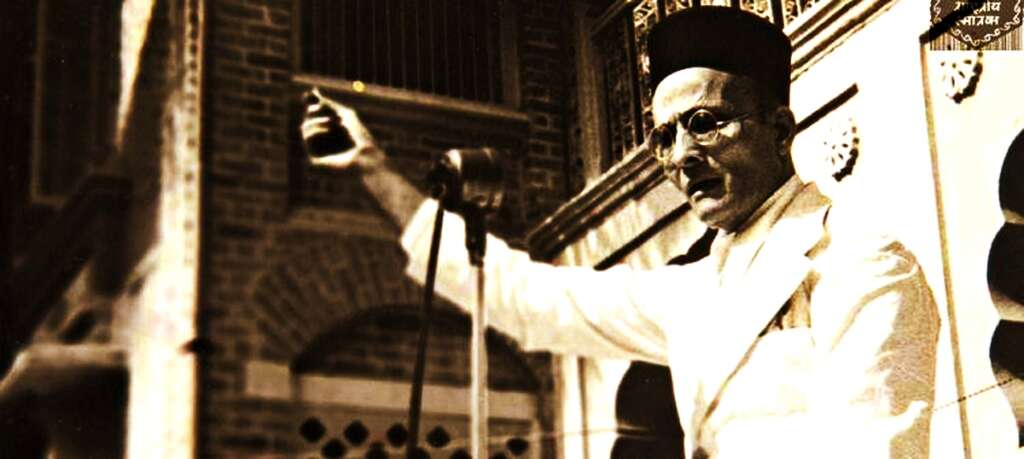Share This Article
The Controversial Legacy of Veer Savarkar: A Journey Through History
Introduction:
Welcome, dear readers, to a journey through the complex and controversial legacy of one of India’s most polarizing figures, Vinayak Damodar Savarkar also known as Veer Savarkar. Set to release on March 22nd, 2024, a historical period movie promises to delve into the life of this enigmatic personality, stirring debates and discussions across the nation. Join me as we explore the life, ideologies, and contributions of Veer Savarkar, a man whose name evokes diverse reactions from admiration to condemnation.
“Oh Motherland, sacrifice for you is like life, living without you is death.”
VD Savarkar, Indian Freedom Fighter
Early Life and Ideological Evolution:
Veer Savarkar, born Vinayak Damodar Savarkar on May 28, 1883, in Nashik, Maharashtra, was a multifaceted personality whose life journey was marked by tumultuous events and ideological transformations. Educated in law, Savarkar was deeply influenced by the nationalist fervor sweeping through India during the early 20th century. His early years were marked by fervent patriotism and a vision for India’s liberation from British rule.
Arrest and Incarceration:

In 1910, Savarkar’s path took a dramatic turn when he was arrested by the British government on charges of sedition. His daring attempt to escape captivity, only to be handed back by French port officials, further cemented his image as a formidable nationalist figure. Sentenced to 50 years of life imprisonment, Savarkar endured the harsh conditions of the Cellular Jail in the Andaman and Nicobar Islands, earning him the moniker “Kaala Paani.”
Literary Contributions and Controversies:
Savarkar’s literary prowess and ideological musings played a significant role in shaping the discourse of Indian nationalism. His seminal work, “The Indian War of Independence,” underscored the role of Hindu-Muslim unity in the struggle against British colonialism, a sentiment that stood in stark contrast to later controversial statements. The revelation regarding the authorship of his biography, “Barrister Savarkar,” added layers of intrigue to his persona, reflecting the complexities of his character.
Critique of Gandhi and Political Stances:

One of the most contentious aspects of Savarkar’s legacy is his outspoken criticism of Mahatma Gandhi and his divergence from the mainstream Indian National Congress. His opposition to the Quit India movement and advocacy for Hindu interests through organizations like the Hindu Mahasabha drew sharp criticism from political adversaries. Moreover, his flirtation with fascist ideologies and admiration for figures like Hitler further fueled the debate surrounding his legacy.
Legacy and Enduring Controversy:

Despite his contributions to India’s struggle for independence and his fervent nationalism, Veer Savarkar’s legacy remains deeply divisive. His shifting ideologies, from advocating Hindu-Muslim unity to espousing divisive rhetoric, continue to evoke strong reactions from various quarters of society. The assassination of Mahatma Gandhi and Savarkar’s alleged involvement in the conspiracy further cloud his legacy with controversy and conjecture.
End Note:
In the tapestry of India’s freedom struggle, Veer Savarkar emerges as a complex and polarizing figure, whose legacy defies easy categorization. As we await the release of the much-anticipated movie on his life, it is essential to engage critically with his ideas and actions, acknowledging both his contributions and shortcomings. Only through a nuanced understanding can we unravel the enigma of Veer Savarkar and appreciate the intricate dynamics of India’s struggle for independence.
Sources:
- “Veer Savarkar: A Contested Legacy” by Dhananjay Keer
- “Savarkar and His Times” by Dhananjay Keer
- “The Indian War of Independence” by Vinayak Damodar Savarkar
- “Savarkar: Echoes from a Forgotten Past, 1883–1924” by Vikram Sampath
- “Savarkar: The True Story of the Father of Hindutva” by Vaibhav Purandare
1 Comment